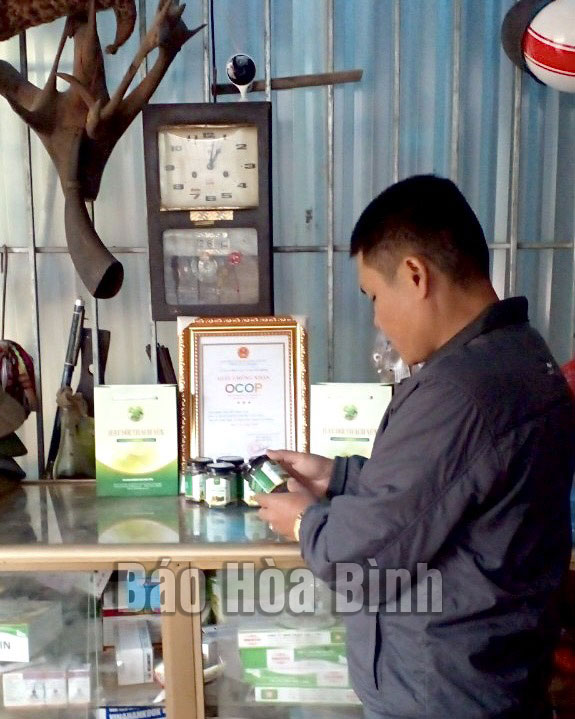
(HBO) - Ngai village in Thach Yen commune, Cao Phong district is home to about 100 natural doi trees. Bui Van Tien’s family living there has cared for and expanded farming area with the hope of turning the product into a high-quality specialty to put up for sales in the market.

Thach Yen doi seeds are recognised as a three-starred
One Commune, One Product product
Doi tree belongs to the wood line with an average height of about 15-20m and
the canopy of tens of meters in width. This kind of plant usually grows on
open, fresh and sunny hills. Since ancient times, Muong and Thai ethnic people
in Hoa Binh have used doi seeds as a spice to create a unique flavor for ethnic
dishes. Apart from being used as a spice, doi seeds are used as a medicine to
support the treatment of digestive problems, soak in alcohol as a massage
medicine to treat pains, or can be drunk as a medicinal wine with an amount
small enough each day to improve health.
Tien said after carefully learning about doi trees, he went to neighbouring
areas to learn experience in organic farming. The cultivation process is not
too complicated. From the fifth year onwards, there is almost no need to take
care of them. After being picked and dried, the fresh seeds will turn from red
to black
The harvest season of this "black gem" lasts from September to
November, with trees yielding up to 30 kg of dry seeds. With the market price
of over 2 million VND per kg of dry seeds, this kind of plant has high and
sustainable economic value, contributing to reducing poverty in the locality.
The bottle is full of information about the production facility and stamp with
a QR code to make it easier for customers to trace the origin.
Thach Yen doi seeds have been recognised by the provincial People’s Committee
as a three-starred One Commune, One Product (OCOP) product since 2020. However,
they are mostly produced on a household scale which is fragmented and small.
With the selling price of 250,000 VND for a 100g bottle, Tien has sold over
10kg of dried doi seeds since early this year. In order to improve product
quality, it is necessary to gain the support and companionship of authorities
at all levels, develop appropriate forms of production to stimulate the process
of linking production and consumption, strengthen trade promotion to expand
consumption, support in-depth training for those involved in the OCOP Programme
to have knowledge of production management and marketing.
Dao Village’s honey – a product certified with a 3-star OCOP (One Commune One Product) rating by Thong Nhat Agricultural Cooperative in Dao Village (Hoa Binh City) – is highly regarded by consumers for its quality, richness, and variety in packaging. The distinctively sweet taste of Dao Village’s honey leaves a lasting impression on anyone who has tried it.
In alignment with Project No. 07-DA/TU, issued by the Hoa Binh provincial Party Committee on November 1, 2021, Lac Thuy district has actively promoted investment and supported the sustainable development of its industrial and handicraft sectors during the 2021–2025 period. Alongside this, the district has remained committed to preserving and revitalising traditional craft villages.
Located in the northern part of Lac Thuy district, with a temperate climate and fertile soil, Phu Thanh commune has great potential and advantages in growing tea. The long-standing experience, combined with strict adherence to organic farming practices in the tea gardens, ensures that the dried tea products from Phu Thanh and Lac Thuy as a whole are sold out immediately upon production, providing a stable and prosperous life for the local people.
Amid efforts to streamline the administrative apparatus, Hoa Binh province has intensified measures to address challenges in land clearance, resettlement support, and infrastructure investment, aiming to speed up the progress of key projects.
Hoa Binh province has posted an unprecedented economic growth rate of 12.76% in the first quarter of 2025, marking its highest quarterly performance to date and positioning it as the second fastest-growing locality in the country, trailing only Bac Giang province.
Under current regulations, products in the One Commune – One Product (OCOP) programme that are rated three stars or higher must undergo re-evaluation every three months. However, in reality, some of these products fail to consistently meet the required standards, raising concerns about the sustainability of their OCOP certification. This underscores the urgent need for producers to enhance product quality and gradually develop their OCOP products into strong, marketable brands.



